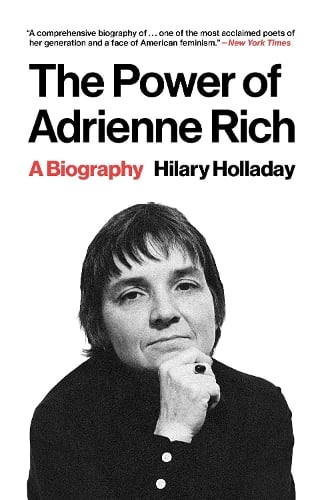Inspiring Older Readers
 posted on 22 Jun 2025
posted on 22 Jun 2025
The Power of Adrienne Rich: A Biography by Hilary Holladay
Hilary Holladay, biographer, journalist, and scholar of modern and contemporary American poetry, has given us what is, I think, the first full biography of the hugely talented American poet, Adrienne Rich (1929 – 2012). But that bald statement conceals something much more multi-dimensional – yes, it’s a biography but it’s also an appreciation of the poetry and, perhaps most impressive of all, a compelling story of an artist on a journey to find their identity.
The story of Adrienne Rich would be interesting enough if it was a relatively conventional one mapping her development as an outstanding poet and essayist but, of course, the story doesn’t stop there: in finding her true voice she also became a leading light in the feminist movement (although she apparently preferred the term ‘women’s liberation’), an active opponent of racism and a tireless campaigner for social justice.
The picture Holladay paints in the first third of the book is of a precocious, academically capable and talented young women, under the sometimes overbearing support of her father, deeply immersed in the arts and academia from a young age. She was at one level a very conventional high achiever – she attended Radcliffe, the ‘female’ arm of Harvard in those gender segregated days, and developed as a writer and specifically a poet and a woman who longed for a settled life with a husband and children. Perhaps the one dark cloud on her horizon was an early diagnosis of rheumatoid arthritis which would be with her for life and may well have played a significant part in her end.
As Rich developed as a poet she finds herself moving amongst some of the big names of mid-20th century poetry – Robert Lowell, Louise Glück, Sylvia Plath, Ted Hughes all come alive in Holladay’s narrative, even though Rich’s relationship with them was not always as cordial as it might have been.
With a husband and three children, an academic post and a growing catalogue of generally well-received poetry, Rich’s life might seem to be mapped out but I think her biographer here has been clever and astute by using her poetry to suggest that, actually, Rich was becoming aware at this point that there was something missing from this picture – that the voice in the poetry wasn’t the finished thing and that there was more in the hinterland to explore.
Following this path, the decision the family makes to move to New York in mid-1960s turns out to be pivotal:
“….Adrienne now set about falling in love with New York and making it her hometown. Over the next several years, she would walk the sidewalks in a private reverie…..and savor the neighbourhood scenes she and her family were now part of.”
But it wasn't just the physical environment of New York that transformed Rich as a poet and a person, it was the broiling intellectual melting-pot of ideas and late-60s radicalism that captured her. Rich found herself at the heart of what was effectively the new-Left and was increasingly drawn into the struggles emerging around gender and race in particular. And it was not only the poet that was changed – so was her husband, but not for the better. Rising tensions over Adrienne’s activities drove a wedge between her and her husband, leading, sadly, to his eventual suicide.
By 1974, Rich’s poetry was starting to explore the social status of women more consistently and she shared a poetry prize with the likes of Audre Lorde and Alice Walker. In her personal life too, it had become clear to her that her sexual identity was now under her scrutiny:
"The suppressed lesbian I had been carrying in me since adolescence began to stretch her limbs."
This period was a time of complexity, activism and self-revelation that Holladay captures in detail and which gives the whole book a sense of exciting forward momentum – something for you to explore for yourself rather have me butcher it in a short review like this.
The rheumatoid arthritis that had been with her throughout came out with a vengeance as she aged but it never dulled the flame of radicalism that she discovered in herself. Actually, if you don’t know the work of Adrienne Rich (and my knowledge was indeed skimpy when I picked this book up), this biography is a good place to start and it will, I’m sure send you off to find the poems and the prose.
Available now from Princeton University Press, you can get a copy from your local independent bookshop – who will be glad to order it for you if they don’t have it on their shelves.
Terry Potter
June 2025